

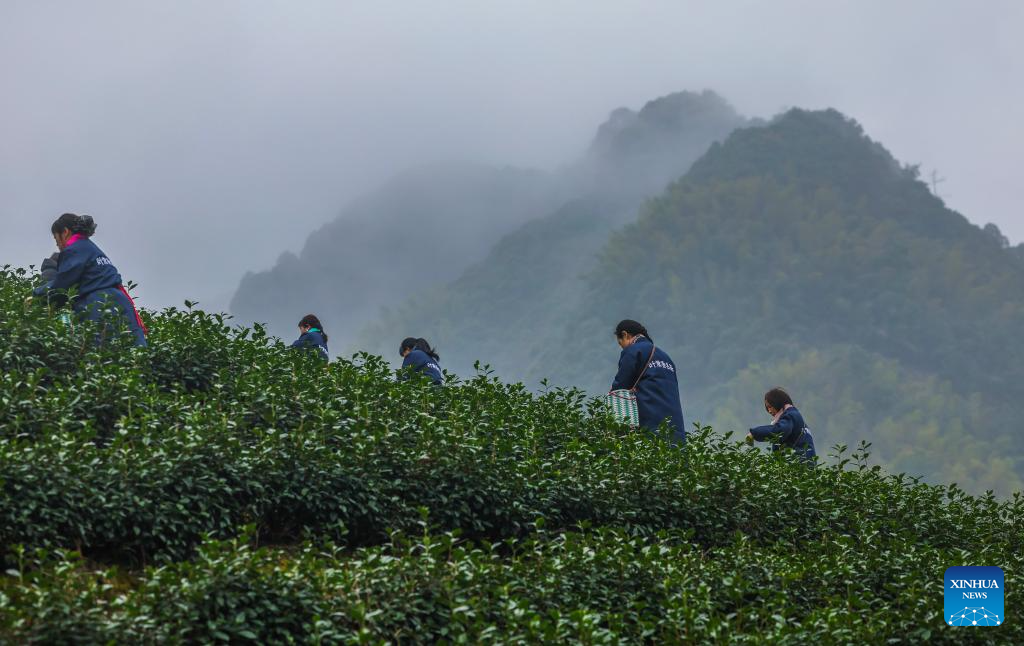
Farmers pick tea leaves at a tea garden in Wangzhai Town of Wuyi County, Jinhua City, east China's Zhejiang Province, March 5, 2025. As spring unfolds, tea gardens across Wuyi County have entered the harvest season.
In recent years, Wuyi County has advanced the tea industry as its pillar industry. By the end of 2024, the total area of tea plantation in Wuyi County has reached 125,700 mu (approximately 8,380 hectares). More than 60,000 farmers have directly benefited from tea-related businesses. (Xinhua/Xu Yu)
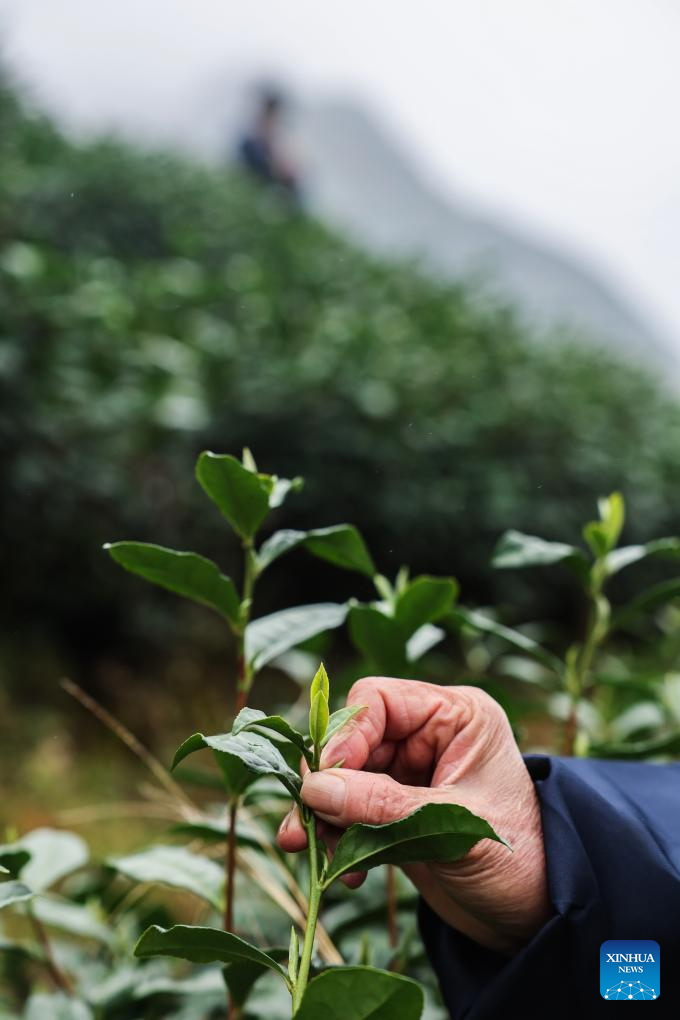
A farmer picks tea leaves at a tea garden in Wangzhai Town of Wuyi County, Jinhua City, east China's Zhejiang Province, March 5, 2025. As spring unfolds, tea gardens across Wuyi County have entered the harvest season.
In recent years, Wuyi County has advanced the tea industry as its pillar industry. By the end of 2024, the total area of tea plantation in Wuyi County has reached 125,700 mu (approximately 8,380 hectares). More than 60,000 farmers have directly benefited from tea-related businesses. (Xinhua/Xu Yu)
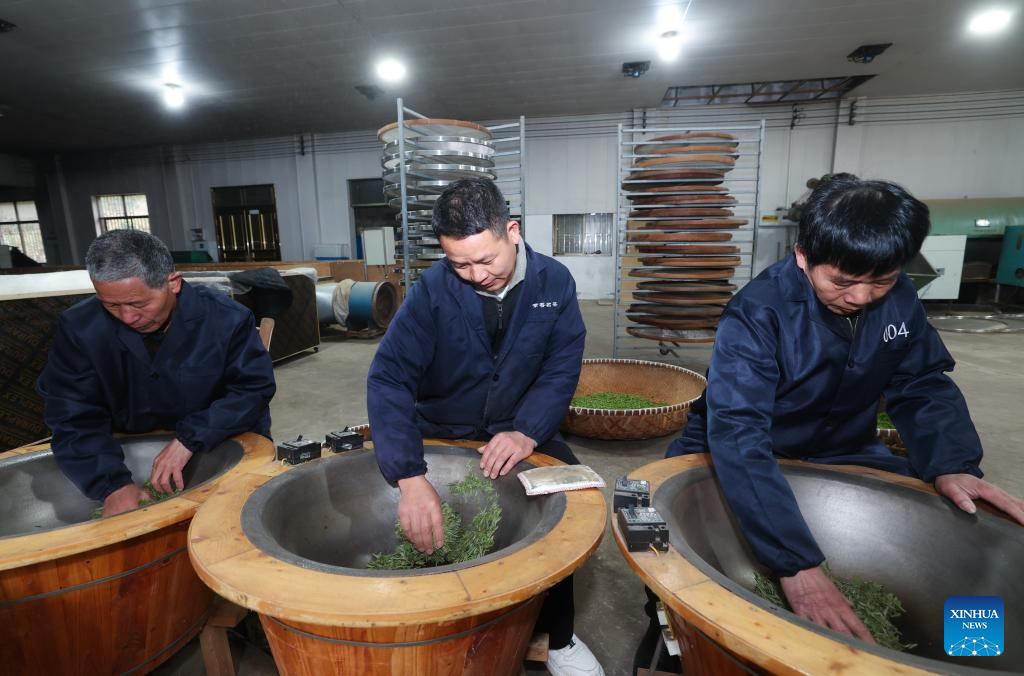
Workers process tea leaves at the workshop of a tea garden in Wangzhai Town of Wuyi County, Jinhua City, east China's Zhejiang Province, March 5, 2025. As spring unfolds, tea gardens across Wuyi County have entered the harvest season.
In recent years, Wuyi County has advanced the tea industry as its pillar industry. By the end of 2024, the total area of tea plantation in Wuyi County has reached 125,700 mu (approximately 8,380 hectares). More than 60,000 farmers have directly benefited from tea-related businesses. (Xinhua/Xu Yu)
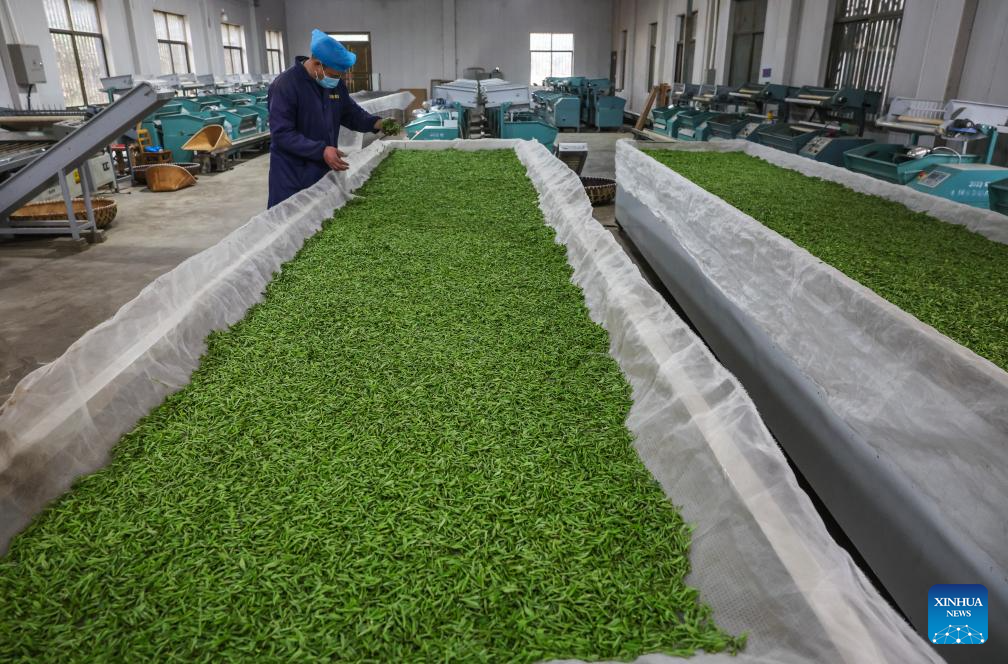
A worker processes tea leaves at the workshop of a tea garden in Wangzhai Town of Wuyi County, Jinhua City, east China's Zhejiang Province, March 5, 2025. As spring unfolds, tea gardens across Wuyi County have entered the harvest season.
In recent years, Wuyi County has advanced the tea industry as its pillar industry. By the end of 2024, the total area of tea plantation in Wuyi County has reached 125,700 mu (approximately 8,380 hectares). More than 60,000 farmers have directly benefited from tea-related businesses. (Xinhua/Xu Yu)
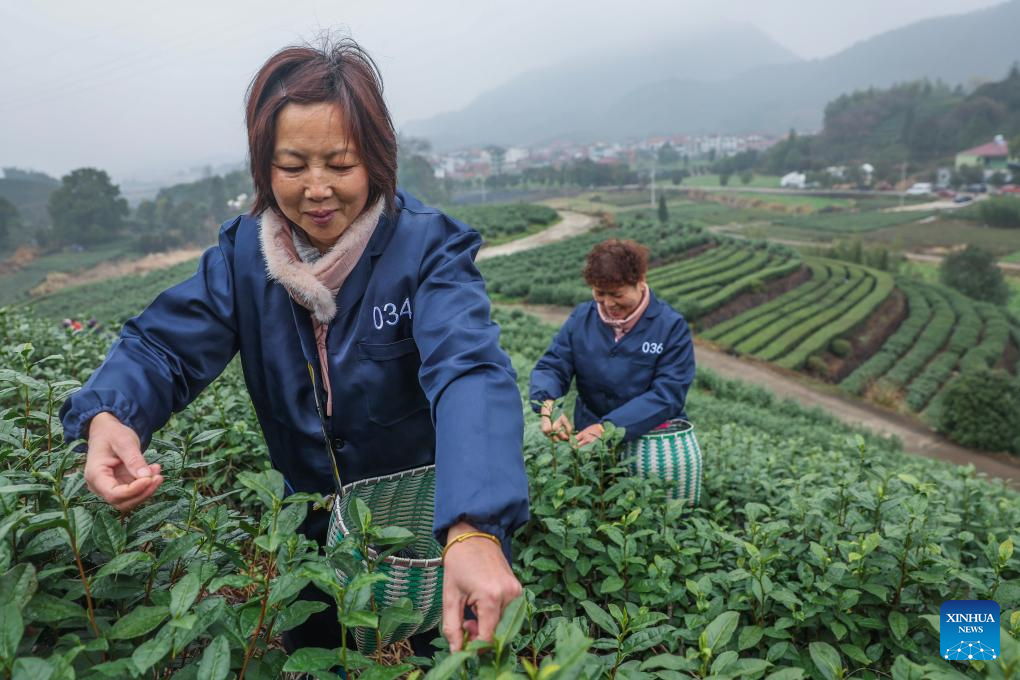
Farmers pick tea leaves at a tea garden in Wangzhai Town of Wuyi County, Jinhua City, east China's Zhejiang Province, March 5, 2025. As spring unfolds, tea gardens across Wuyi County have entered the harvest season.
In recent years, Wuyi County has advanced the tea industry as its pillar industry. By the end of 2024, the total area of tea plantation in Wuyi County has reached 125,700 mu (approximately 8,380 hectares). More than 60,000 farmers have directly benefited from tea-related businesses. (Xinhua/Xu Yu)
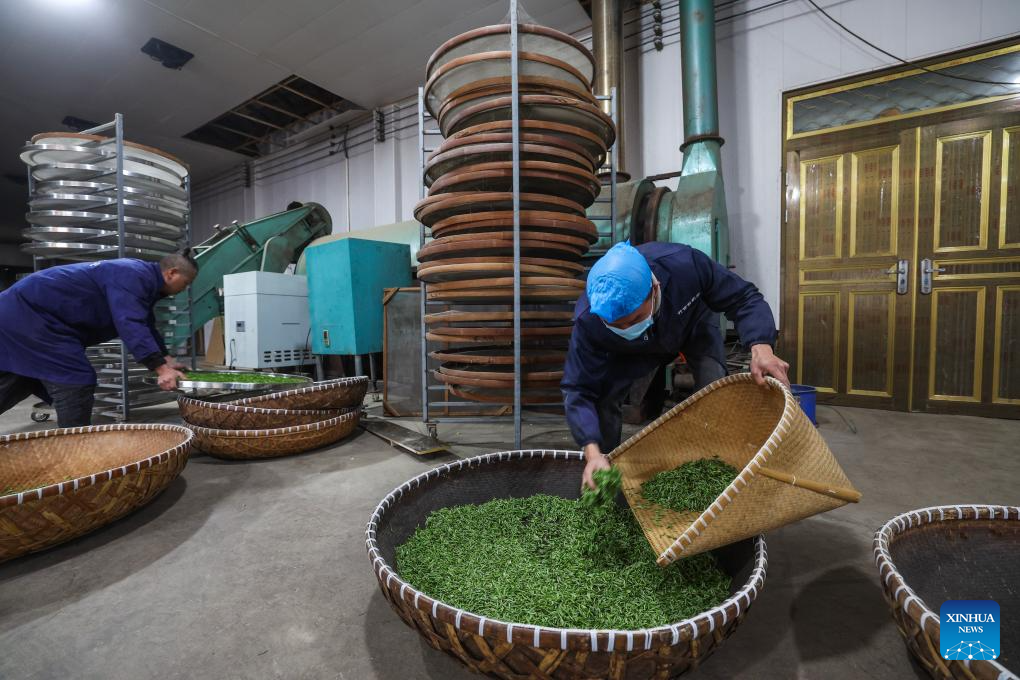
Workers process tea leaves at the workshop of a tea garden in Wangzhai Town of Wuyi County, Jinhua City, east China's Zhejiang Province, March 5, 2025. As spring unfolds, tea gardens across Wuyi County have entered the harvest season.
In recent years, Wuyi County has advanced the tea industry as its pillar industry. By the end of 2024, the total area of tea plantation in Wuyi County has reached 125,700 mu (approximately 8,380 hectares). More than 60,000 farmers have directly benefited from tea-related businesses. (Xinhua/Xu Yu)
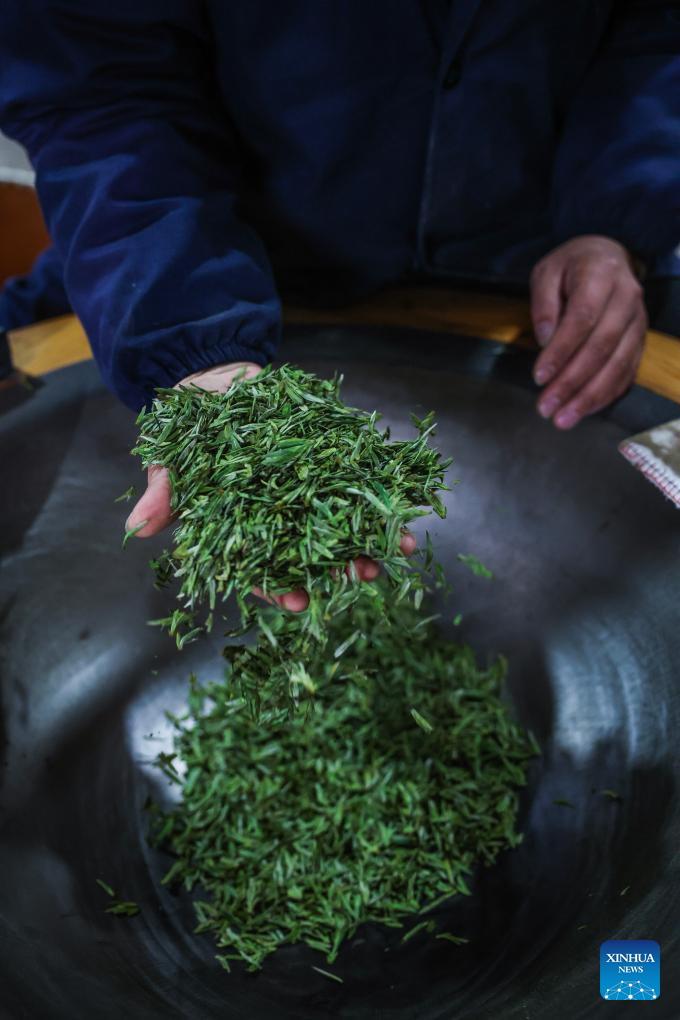
A worker processes tea leaves at the workshop of a tea garden in Wangzhai Town of Wuyi County, Jinhua City, east China's Zhejiang Province, March 5, 2025. As spring unfolds, tea gardens across Wuyi County have entered the harvest season.
In recent years, Wuyi County has advanced the tea industry as its pillar industry. By the end of 2024, the total area of tea plantation in Wuyi County has reached 125,700 mu (approximately 8,380 hectares). More than 60,000 farmers have directly benefited from tea-related businesses. (Xinhua/Xu Yu)
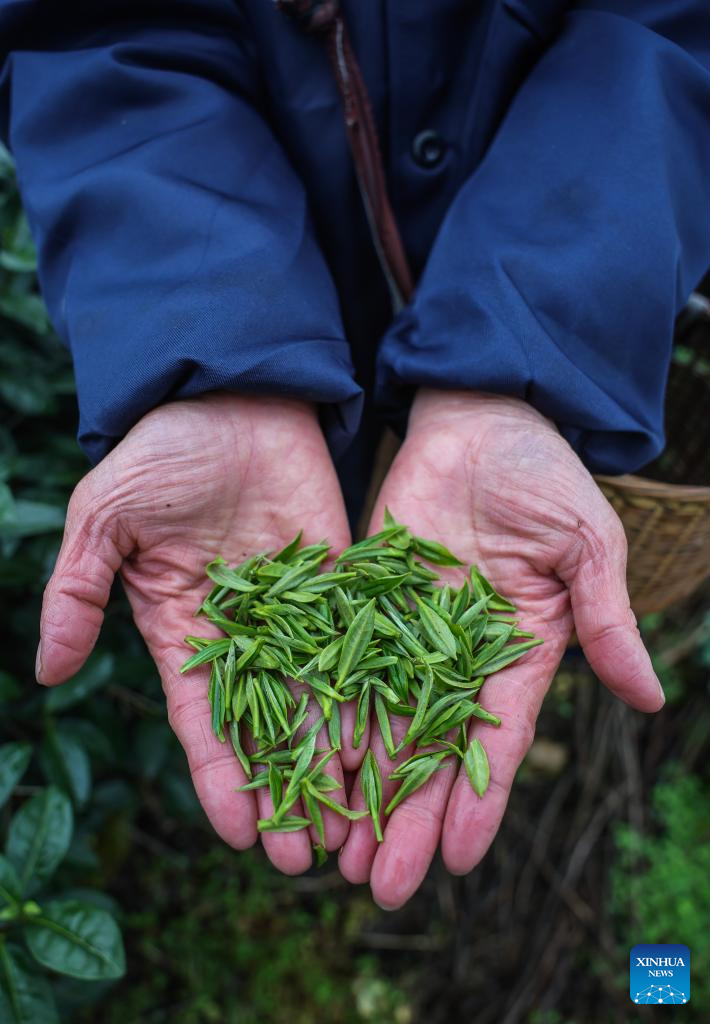
A farmer displays freshly-picked tea leaves at a tea garden in Wangzhai Town of Wuyi County, Jinhua City, east China's Zhejiang Province, March 5, 2025. As spring unfolds, tea gardens across Wuyi County have entered the harvest season.
In recent years, Wuyi County has advanced the tea industry as its pillar industry. By the end of 2024, the total area of tea plantation in Wuyi County has reached 125,700 mu (approximately 8,380 hectares). More than 60,000 farmers have directly benefited from tea-related businesses. (Xinhua/Xu Yu)
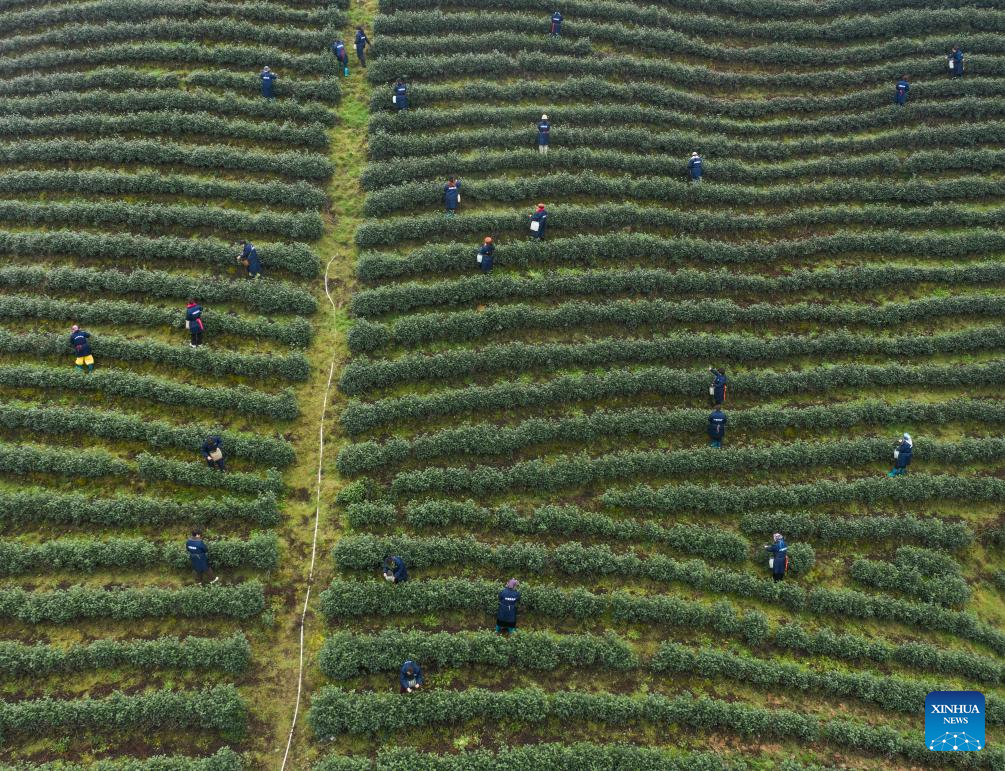
An aerial drone photo taken on March 5, 2025 shows farmers picking tea leaves at a tea garden in Wangzhai Town of Wuyi County, Jinhua City, east China's Zhejiang Province. As spring unfolds, tea gardens across Wuyi County have entered the harvest season.
In recent years, Wuyi County has advanced the tea industry as its pillar industry. By the end of 2024, the total area of tea plantation in Wuyi County has reached 125,700 mu (approximately 8,380 hectares). More than 60,000 farmers have directly benefited from tea-related businesses. (Xinhua/Xu Yu)
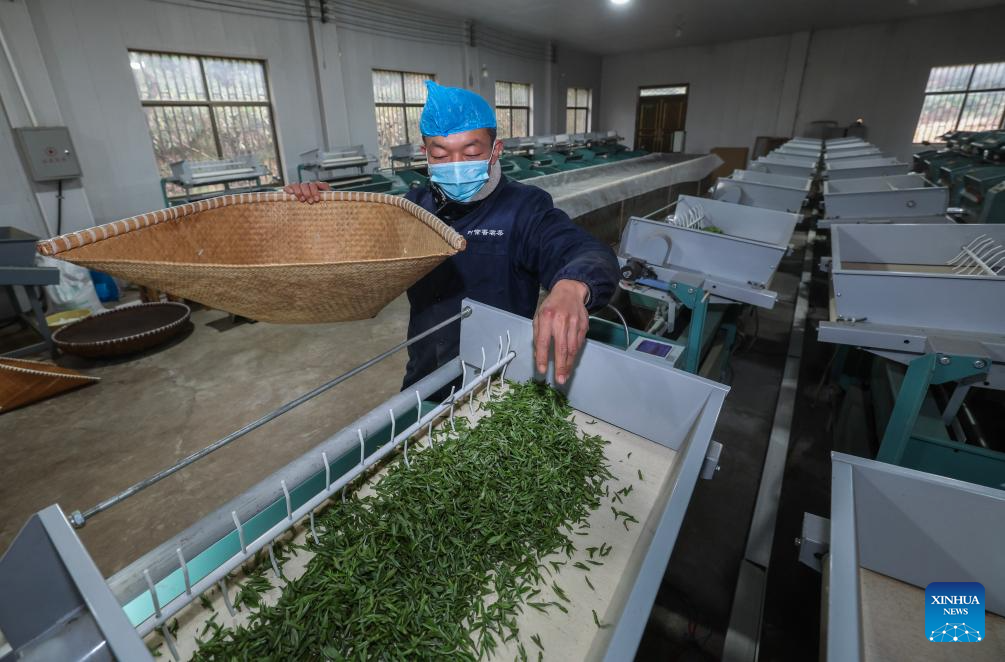
A worker processes tea leaves at the workshop of a tea garden in Wangzhai Town of Wuyi County, Jinhua City, east China's Zhejiang Province, March 5, 2025. As spring unfolds, tea gardens across Wuyi County have entered the harvest season.
In recent years, Wuyi County has advanced the tea industry as its pillar industry. By the end of 2024, the total area of tea plantation in Wuyi County has reached 125,700 mu (approximately 8,380 hectares). More than 60,000 farmers have directly benefited from tea-related businesses. (Xinhua/Xu Yu)
点击右上角![]() 微信好友
微信好友
 朋友圈
朋友圈

请使用浏览器分享功能进行分享
